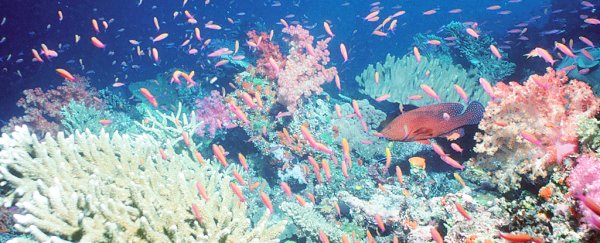While climate change and rising sea levels threaten countless communities living in coastal regions, it could have one unexpected positive effect: cooling down coral reefs.
Scientists have been looking at how tidal changes off the coast of Western Australia have been affecting the reefs that lie below, and found that extra seawater above the coral has the potential to significantly reduce temperatures.
By studying the effects of changing tides around the Kimberley region, experts from the University of Western Australia produced a computer model designed to map the same data across a predicted global sea level rise of up to 1.5 metres (4.9 feet) in the future.
"Temperature is widely recognised as a key environmental driver of reefs and temperature extremes are known to be one of the key stressors to coral reef communities around the world," explained the study's lead researcher, Ryan Lowe.
The ocean around the Kimberley sees some of the most extreme tidal ranges in the world – up to 12 metres (39 feet) sometimes – and Lowe and his team wanted to look at how tidal variations might affect coral reefs in the years ahead.
During their field studies, temperatures were spotted varying by more than 10 degrees Celsius (50 degrees Fahrenheit) in a single cycle, and getting as high as 38 degrees Celsius (100 degrees Fahrenheit). Low tides and an overhead Sun position at noon combined to cause the highest temperatures.
"Even a modest rise in sea level could help lower the water temperature of the reef and may also partially reduce reef heat extremes in the world's warming oceans," said Lowe.
Water temperature is extremely important to corals, because above a certain heat, many species go into stress, and kick out the symbiotic algae living inside. If temperatures don't return to a normal range fast enough, the coral will bleach and eventually starve without the nutrients produced by the algae.
You can see that happening in this creepy video, which is the first time the bleaching process has ever been captured on film:
There's an important caveat to this research, though: the benefits of rising sea levels might only be felt by reefs affected by tides in the same way as those in the Kimberley, which is estimated to be around a third of coral reefs worldwide.
"While rising sea temperature from global warming will clearly have negative effects on reefs globally, these shallow, tide-dominated reefs should at least see some reduction in the large temperature variations they presently experience," Lowe told Karl Gruber at Australian Geographic.
And there are a lot of other factors contributing to reef health besides the tidal temperature changes, of course. The team is continuing their investigation to see what the long-term impact could be for this most delicate form of undersea life.
Still, it's interesting to consider that climate change can cause both positive and negative impacts on the world around us. Earlier this year, researchers showed that melting icebergs might actually slow down global warming by releasing trails of algae that trap carbon dioxide.
Those small benefits aren't enough to make up for the threats posed by climate change to both marine and terrestrial life, but it's nice to know it's not all bad news.
Their findings have been published in Science Advances.
